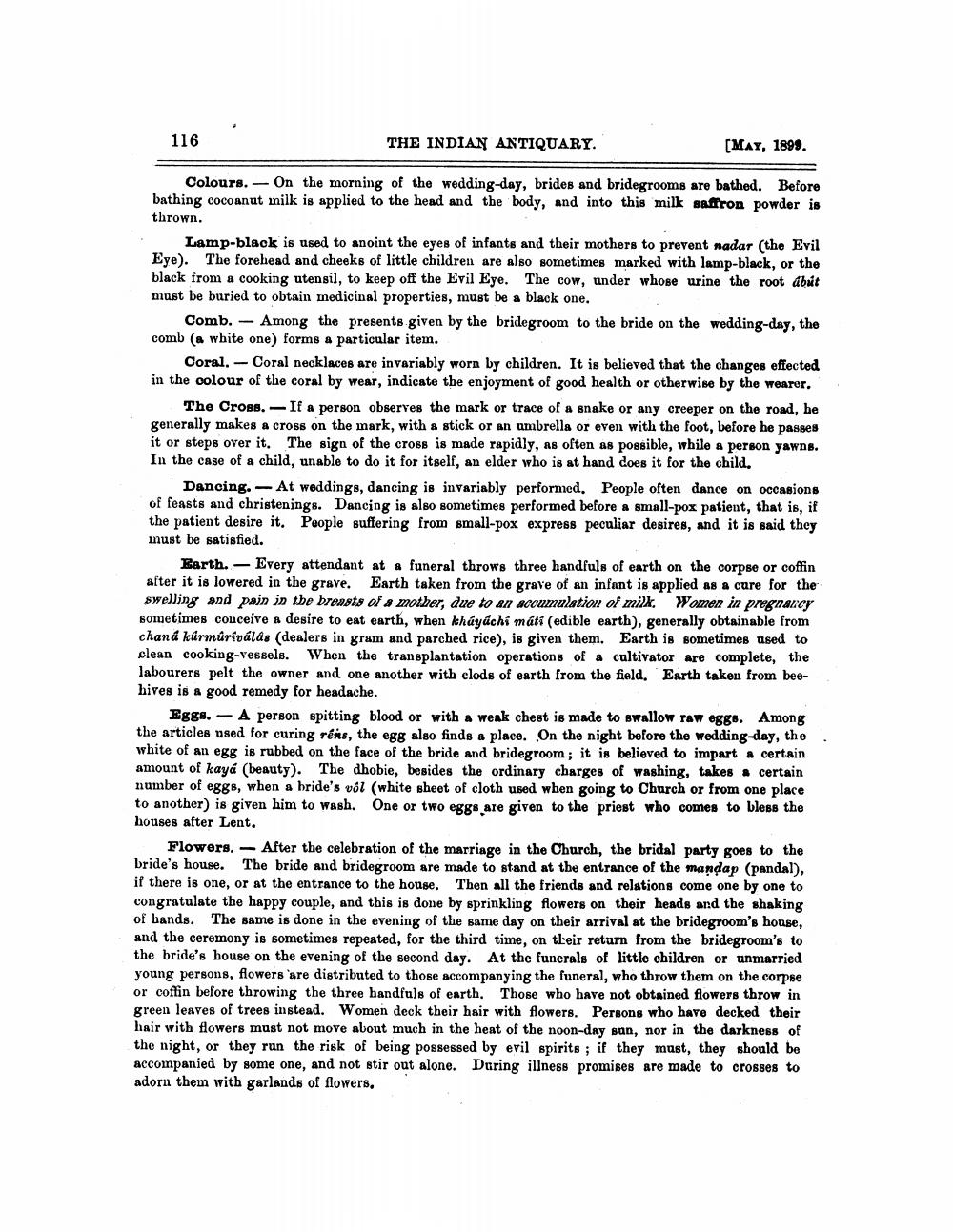________________
116
THE INDIAN ANTIQUARY.
[MAY, 1899.
Colours. On the morning of the wedding-day, brides and bridegrooms are bathed. Before bathing cocoanut milk is applied to the head and the body, and into this milk saffron powder is thrown.
Lamp-black is used to anoint the eyes of infants and their mothers to prevent nadar (the Evil Eye). The forehead and cheeks of little children are also sometimes marked with lamp-black, or the black from a cooking utensil, to keep off the Evil Eye. The cow, under whose urine the root ábút must be buried to obtain medicinal properties, must be a black one.
Comb. Among the presents given by the bridegroom to the bride on the wedding-day, the comb (a white one) forms a particular item.
Coral. Coral necklaces are invariably worn by children. It is believed that the changes effected in the colour of the coral by wear, indicate the enjoyment of good health or otherwise by the wearer.
The Cross.If a person observes the mark or trace of a snake or any creeper on the road, he generally makes a cross on the mark, with a stick or an umbrella or even with the foot, before he passes it or steps over it. The sign of the cross is made rapidly, as often as possible, while a person yawns. In the case of a child, unable to do it for itself, an elder who is at hand does it for the child.
Dancing. At weddings, dancing is invariably performed. People often dance on occasions of feasts and christenings. Dancing is also sometimes performed before a small-pox patient, that is, if the patient desire it. People suffering from small-pox express peculiar desires, and it is said they must be satisfied.
Earth. Every attendant at a funeral throws three handfuls of earth on the corpse or coffin after it is lowered in the grave. Earth taken from the grave of an infant is applied as a cure for the swelling and pain in the breasts of a mother, due to an accumulation of milk. Women in pregnancy sometimes conceive a desire to eat earth, when kháyáchí máti (edible earth), generally obtainable from chaná kúrmûriválás (dealers in gram and parched rice), is given them. Earth is sometimes used to clean cooking-vessels. When the transplantation operations of a cultivator are complete, the labourers pelt the owner and one another with clods of earth from the field. Earth taken from beehives is a good remedy for headache.
Eggs. A person spitting blood or with a weak chest is made to swallow raw eggs. Among the articles used for curing réns, the egg also finds a place. On the night before the wedding-day, the white of an egg is rubbed on the face of the bride and bridegroom; it is believed to impart a certain amount of kaya (beauty). The dhobie, besides the ordinary charges of washing, takes a certain number of eggs, when a bride's vól (white sheet of cloth used when going to Church or from one place to another) is given him to wash. One or two eggs are given to the priest who comes to bless the houses after Lent.
Flowers. After the celebration of the marriage in the Church, the bridal party goes to the bride's house. The bride and bridegroom are made to stand at the entrance of the mandap (pandal), if there is one, or at the entrance to the house. Then all the friends and relations come one by one to congratulate the happy couple, and this is done by sprinkling flowers on their heads and the shaking of hands. The same is done in the evening of the same day on their arrival at the bridegroom's house, and the ceremony is sometimes repeated, for the third time, on their return from the bridegroom's to the bride's house on the evening of the second day. At the funerals of little children or unmarried young persons, flowers are distributed to those accompanying the funeral, who throw them on the corpse or coffin before throwing the three handfuls of earth. Those who have not obtained flowers throw in green leaves of trees instead. Women deck their hair with flowers. Persons who have decked their hair with flowers must not move about much in the heat of the noon-day sun, nor in the darkness of the night, or they run the risk of being possessed by evil spirits; if they must, they should be accompanied by some one, and not stir out alone. During illness promises are made to crosses to adorn them with garlands of flowers.




